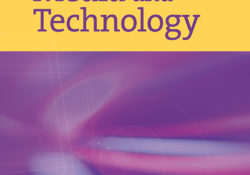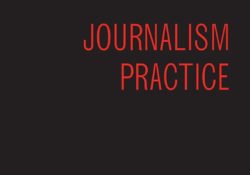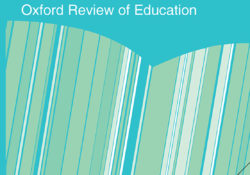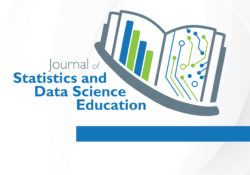tandfonline.com har udgivet en rapport under søgningen “Teacher Education Mathematics”: Immersive virtual reality (VR) for digital media making: transmediation is key Link til kilde
Like this:
Like Loading...
tandfonline.com har udgivet en rapport under søgningen “Teacher Education Mathematics”: ABSTRACT ABSTRACT Lectures prevail as a ubiquitous teaching and learning method across universities worldwide. Whereas lectures have been conceptualized from language-centred perspectives, lectures’ materiality as linked to their socio-cultural and historical meanings have been scarcely explored. To address this gap, we tackle the materiality of communication in ten live recorded lectures – collectively viewed more than 1,000,000 times – uploaded by ‘top-ranked’ universities in India, Japan, Russia, Egypt, Palestine, Spain, the USA, the UK, Italy and Canada, on their websites or YouTube media channels. The materiality we refer to comprises the key things/artefacts and bodies in the lectures. A multimodal semiotic analysis of non-verbal and material elements of a lecture is applied on the videos to first ‘map’ its material… Continue Reading →
Like this:
Like Loading...
tandfonline.com har udgivet en rapport under søgningen “Teacher Education Mathematics”: ABSTRACT ABSTRACT This article locates media literacy both theoretically and empirically in the public practices carried out by journalists and journalistic actors in the case of Finland. In the theoretical section, the paper discusses the activities under the frameworks of non-formal education and strategic audience development as part of media organisations’ work. In the empirical section, central journalistic actors and their typical best practices are identified. These activities are grouped into three categories: media education on, in and via journalism. It is found that the initiatives aimed at promoting journalistic media education can be seen as focusing on a specific form of journalism literacy in which drawing the boundaries of journalism and non-journalism is a distinguished feature. The paper concludes… Continue Reading →
Like this:
Like Loading...
eric.ed.gov har udgivet: While Michigan students learn a variety of skills in their time at school, perhaps the most important charge of public schools, beyond providing a safe and healthy environment, is to ensure that students are learning their three fundamental skills: reading, writing and arithmetic. Unfortunately, the achievement levels of Michigan public school students raise doubts about the quality of public education in the state. This volume has been written to assist policymakers at the state and local levels who want to initiate and support teacher quality reforms to improve K-12 public education in the state. The author describes shortcomings in public education in the state and discusses the research consensus that good teachers matter, investigating whether certification, experience, graduate degrees, academic ability and high licensure exam scores make… Continue Reading →
Like this:
Like Loading...
eric.ed.gov har udgivet: This 2-page brief presents 8 new directions drawn from the authors’ report “Reflections on the Ready To Learn Initiative, 2010 to 2015” that educational media producers can take to better foster all children’s school readiness and success. Since 2006, EDC and SRI have worked together on a series of efficacy studies and evaluations of Ready To Learn resources. Our research has found that digital media and technology can help families and teachers enhance the math and literacy learning of young children in low-income households. The “Reflections on the Ready To Learn Initiative” report and this 2-page brief are based on the authors’ interviews with 26 children’s media researchers, producers, and thought leaders. [For “Reflections on the Ready To Learn Initiative, 2010 to 2015,” see ED567881.] Link til… Continue Reading →
Like this:
Like Loading...
eric.ed.gov har udgivet: The challenges of education in the era of the industrial revolution include disruption 4.0, 21st-century skills, globalization, and global competition. Chemistry is a subject that needs to be developed in order to improve the educational system in the era of disruption. The purpose of this research is to identify and analyze the needs of the media-based chemistry study ICT at grade X redox materials in State Senior Highschool 8 Semarang during the disruption. The method used in this research is a descriptive qualitative method which consists of the study of literature and the study of the field. Method of data collection is done through observation, question form, documentation, interview teachers, as well as interview students. This research instrument consisting of a sheet of observation, question form, and… Continue Reading →
Like this:
Like Loading...
tandfonline.com har udgivet en rapport under søgningen “Teacher Education Mathematics”: ABSTRACT ABSTRACT Despite UNESCO’s Learning Cities agenda, which argues for the mobilisation of resources to promote education across all sectors and environments, there is little evaluative research on Learning City engagement which is both naturalistic and empirically rigorous. The research on informal adult learning in urban contexts is particularly sparse. This paper provides a case study of informal learning and lifewide literacies amongst Glaswegian adults using three distinct approaches to data collection: a household survey capturing rich data on learning attitudes, behaviours, and literacies; GPS trails that track mobility around the city; and the capture of naturally occurring social media. The work operationalises Learning City indicators, and explores domains beyond education, some of which have not previously been considered in… Continue Reading →
Like this:
Like Loading...
eric.ed.gov har udgivet: Problem Statement: Science, technology, engineering and mathematics (STEM) education aims at improving students’ knowledge and skills in science and math, and thus their attitudes and career choices in these areas. The ultimate goal in STEM education is to create scientifically literate individuals who can survive in the global economy. The identification of new learning outcomes, curriculum programs, and teaching practices needs to be clarified by the STEM education community. Media design processes are a potential teaching method in STEM education that requires learners to design digital media artifacts using a variety of technological tools. Purpose of the Study: This study investigates the impact of science, technology, engineering, and mathematics (STEM) integrated media design processes on 8th grade students’ attitudes toward science and technology classes, as well as… Continue Reading →
Like this:
Like Loading...
tandfonline.com har udgivet en rapport under søgningen “Teacher Education Mathematics”: ABSTRACT ABSTRACT This introduction to the Media Ecology special issue of the Review of Communication provides a broad overview of the history of media ecology, clarifies its main orientations and key thinkers, and then illustrates how problems and orientations within philosophy are symptoms of various kinds of technological mediation. Link til kilde
Like this:
Like Loading...
tandfonline.com har udgivet en rapport under søgningen “Teacher Education Mathematics”: ABSTRACT ABSTRACT We discuss the learning goals, content, and delivery of a University of Plymouth intensive module delivered over four weeks entitled MATH1608PP Understanding Big Data from Social Networks, aimed at introducing students to a broad range of techniques used in modern Data Science. This module made use of R, accessed through RStudio, and some popular R packages. After describing initial examples used to fire student enthusiasm, we explain our approach to teaching data visualization using the ggplot2 package. We discuss other module topics, including basic statistical inference, data manipulation with dplyr and tidyr, data bases and SQL, social media sentiment analysis, Likert-type data, reproducible research using RMarkdown, dimension reduction and clustering, and parallel R. We present four lesson outlines… Continue Reading →
Like this:
Like Loading...





